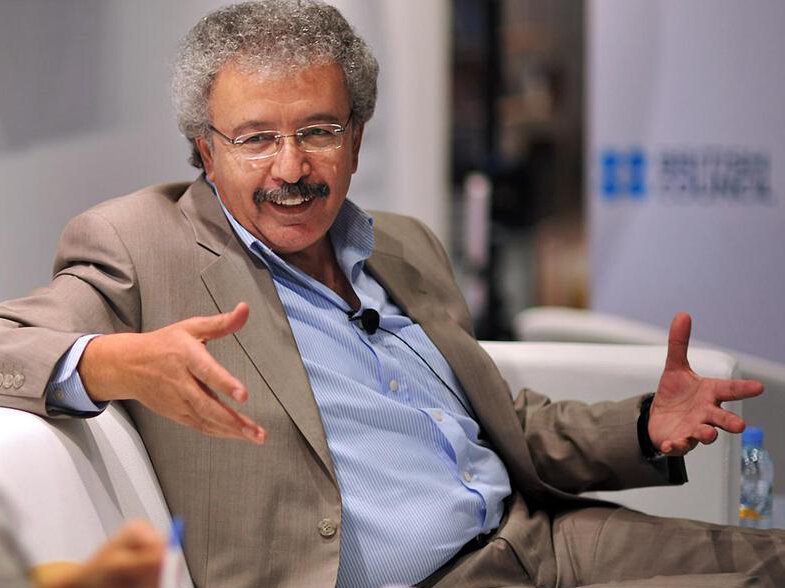Expressing the unseen: Ibrahim Nasrallah’s insights on Palestinian stories, culture

TEHRAN- In a significant cultural event in Tehran on Monday, the Persian translation of Ibrahim Nasrallah’s acclaimed literary works was unveiled during a ceremony dedicated to the resistance and Palestine, drawing renewed attention to the profound contributions of this Palestinian writer.
Published by Amir Kabir Publications in Tehran, the Persian editions of “The Eye of Bethlehem,” “Shadows of the Keys,” and “A Tank Under the Christmas Tree” were unveiled, emphasizing the enduring struggles and sacrifices of the Palestinian people and the resilience of their resistance forces.
Nasrallah, renowned for his poetic voice and narrative depth, stands as a towering figure in contemporary Arabic literature. His works, which traverse themes of resistance, identity, and history, have resonated across the Arab world and beyond. The unveiling of his translated works in Tehran offers a timely opportunity to explore his creative journey, the origins of his celebrated "Bells Trilogy," and his enduring commitment to portraying Palestinian resilience and multicultural identity.
Following the unveiling, the Tehran Times conducted an exclusive interview with Nasrallah, during which he reflected on the origins of his "Bells Trilogy," a set of interconnected novels inspired by the steadfastness of Beit Sahour during the First Intifada. Nasrallah revealed that the idea originated in 1990, amidst the resistance against Zionist occupation. The resilience of Beit Sahour’s Christian community, in particular, served as a catalyst for his portrayal of Palestinian Christian perseverance—a theme he considers vital to understanding the broader Palestinian struggle. The trilogy, comprising "Shadows of the Keys," "The Eye of Bethlehem," and "A Tank Under the Christmas Tree," is conceived as a tribute to Palestinian Christians and their cultural and resistance contributions.
What distinguishes Nasrallah’s work is its emphasis on the multifaceted nature of Palestinian identity and resistance. He emphasized that his trilogy aims to shed light on an often-overlooked aspect of the Palestinian narrative—the Christian dimension—and to challenge the simplistic portrayals of Palestinian resistance as solely Muslim. "My work seeks to demonstrate that Palestine is a multi-faith nation," he explained. "The struggle is shared, and our cultural fabric is enriched by this diversity."
“A large group of Palestinian Christian writers have played a vital role in spreading Palestinian culture and bringing it to the world—among them Emile Habibi, Jabra Ibrahim Jabra, and undoubtedly Edward Said, as well as many others who have truly made a great contribution,” he said and added: “Therefore, this trilogy is in fact a tribute to all of them, and to the continuous struggle of Palestinian Christians from the beginning until today.”
He further noted, “The beauty and importance of this trilogy also lie in the fact that it was written by a Muslim author who honors and takes pride in this Christian role.”
Addressing the broader implications of his writings, Nasrallah stressed that his literary goal is to foster understanding and solidarity. "The message I wish to convey is that Palestinian culture and resistance are collective efforts that transcend religious boundaries," he said. "The world needs to see the diversity within Palestine and recognize the unity that underpins our resilience."
As the Persian translation of Nasrallah’s works gains recognition in Iran, his message of resilience and multicultural coexistence resonates strongly in the region. His literary journey, marked by a firm stance against oppression and a deep appreciation for cultural diversity, continues to inspire readers across borders. Nasrallah’s voice remains a vital testament to the enduring spirit of Palestine and its people, echoing beyond geographical and cultural divides, fostering empathy and understanding in an increasingly complex world.
Nasrallah’s own life story—marked by displacement, cultural activism, and artistic expression—continues to influence his voice. His childhood in a refugee camp, his experiences as a journalist, and his dedication to chronicling Palestinian history through ambitious projects, such as his eight-volume series on modern Palestinian history, imbue his work with authenticity and urgency. His novel "Time of White Horses" (2007), which traces three generations of a Palestinian family through periods of occupation and upheaval, exemplifies his mastery in blending personal narrative with collective history.
Born in 1954 in Amman to Palestinian parents displaced during the Nakba of 1948, Ibrahim Nasrallah’s life is deeply intertwined with the Palestinian refugee experience. Growing up amidst the hardships of life in Al-Wehdat refugee camp, Nasrallah’s early years were marked by a keen awareness of displacement and cultural survival. His educational journey through UNRWA schools and the UNRWA Teacher Training College laid the foundation for a prolific literary career that now spans over four decades.
As a poet, novelist, and photographer, Nasrallah has published numerous works—seventeen poetry collections, two volumes for children, and sixteen novels—that have been translated into several languages including English, Italian, Danish, and Turkish. His literary pursuits have earned him international recognition, including the prestigious International Prize for Arabic Fiction for his novel "The Second Dog War" and the Jerusalem Award for Culture and Creativity.
SAB/
Leave a Comment